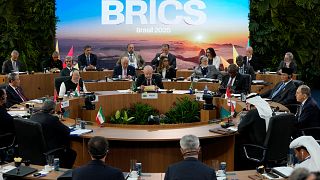
Global South Health: 5 Powerful BRICS Summit Insights
At the recent BRICS summit, global south health emerged as a central topic, reflecting the urgent need for collaboration among developing nations. The summit highlighted the unique challenges and opportunities that countries in the Global South face in improving healthcare outcomes for millions of people. This article explores five powerful insights on global south health, emphasizing the role BRICS countries play in shaping sustainable healthcare solutions to benefit millions.

Understanding the Critical Role of Global South Health in BRICS Discussions
The BRICS countries—Brazil, Russia, India, China, and South Africa—represent a significant portion of the global population and carry a substantial burden of disease. Their discussions on global south health underscore the need for tailored healthcare strategies that address local socio-economic realities. These strategies are vital to improve access to essential services, reduce health disparities, and promote equity among underserved populations.
By focusing on local challenges such as limited infrastructure and health workforce shortages, BRICS nations aim to foster regional cooperation that enhances healthcare delivery systems. The summit’s emphasis on inclusive health policy aims to ensure that all segments of society can benefit equally from health advancements.

Why Global South Health Demands Unique Approaches
Unlike wealthier nations, Global South countries face multifaceted challenges, including inadequate infrastructure, financial constraints, and limited access to medical technologies. The BRICS summit stressed that overcoming these challenges requires innovative approaches, such as community-based healthcare programs, scalable technologies, and sustainable financing models tailored to these countries’ specific contexts.
Implementing context-specific interventions allows Global South countries to maximize the impact of limited resources and develop health systems that are more resilient to crises like pandemics or economic downturns. The adoption of innovative health tools and data analytics is also a major focus to track progress and adjust strategies effectively.
BRICS Summit: Collaborative Efforts to Advance Global South Health
The summit showcased how BRICS nations are working together to develop shared health initiatives that benefit all member countries. Through joint research projects, technology transfer agreements, and capacity-building programs, these nations are fostering a collaborative environment to tackle common health issues more efficiently.
This cooperation not only strengthens the individual health systems within BRICS but also serves as a model for wider international cooperation among Global South countries. Such partnerships help in pooling resources and sharing expertise, which are critical for addressing large-scale health challenges effectively.
For readers interested in how international cooperation strengthens health systems, check our detailed guide on global health cooperation strategies.
Innovative Health Financing Models Discussed
A key highlight of the summit was the discussion around sustainable financing for health infrastructure and services. BRICS leaders explored models like pooled funding, public-private partnerships, and optimized international aid to ensure long-term financial stability for health programs in the Global South.
By leveraging these financing strategies, Global South countries can reduce dependency on inconsistent external funding and invest in building resilient health systems capable of withstanding future shocks, including emerging diseases and demographic changes.
Challenges Facing Global South Health and How BRICS Addresses Them
Despite the progress made, many challenges persist in the Global South, including the high burden of infectious diseases, rising prevalence of chronic illnesses, and uneven access to quality healthcare services. The BRICS summit reaffirmed the commitment to addressing these issues by improving health education, boosting preventive care, and expanding access through digital health technologies.
Enhancing primary healthcare and focusing on early diagnosis and treatment can reduce long-term healthcare costs and improve population health outcomes. BRICS countries are investing in community outreach and telehealth services to reach remote and vulnerable populations more effectively.
For comprehensive data on health challenges in the Global South, visit the World Health Organization (WHO).
Technology and Innovation as Catalysts for Change
Technological innovation featured prominently in the summit discussions as a game-changer for global south health. Telemedicine, AI-driven diagnostics, and mobile health applications are increasingly helping bridge the gap in healthcare access, especially in rural and underserved areas.
These tools not only improve patient outcomes but also enhance data collection and health monitoring, enabling policymakers to make informed decisions based on real-time information. BRICS countries are leading efforts to adapt and scale these technologies regionally.
Moreover, the summit highlighted the importance of building digital infrastructure and addressing digital literacy gaps to maximize the benefits of health technologies in the Global South.
Collaborations with tech companies and startups were encouraged to foster innovation ecosystems that focus on health challenges specific to these regions.
Impact of Global South Health Initiatives on Global Healthcare
The initiatives launched at the BRICS summit have the potential to influence global healthcare policies beyond the member countries. Strengthening health systems in the Global South contributes to global health security by better preparing the world to respond to pandemics and other cross-border health threats.
This interconnected approach to health underlines the importance of solidarity and shared responsibility, fostering an environment where all countries benefit from improved disease surveillance, vaccine development, and emergency response capabilities.
The BRICS model encourages the adoption of similar cooperative frameworks in other global regions, potentially transforming global health governance into a more inclusive and effective system.
These efforts ultimately contribute to achieving universal health coverage goals and the broader Sustainable Development Goals (SDGs).
Voices from the Summit: Leadership and Vision
Leaders at the BRICS summit emphasized the importance of inclusive and sustainable health policies that prioritize resilience and equity. Their statements reflected a shared vision of a healthier Global South where no community is left behind, ensuring that future generations have access to quality healthcare services.
This leadership commitment is critical for mobilizing resources and political will, fostering innovation, and sustaining momentum for health reforms in these rapidly evolving regions.
The summit also underscored the importance of involving civil society and community leaders in health decision-making processes to ensure policies are responsive to the needs of all citizens.
Such inclusive governance models are key to building trust and achieving long-term success in improving global south health outcomes.
Conclusion: The Future of Global South Health Post-BRICS Summit
The BRICS summit marked a pivotal moment in recognizing and addressing the health needs of the Global South. Through strengthened partnerships, innovative financing, and a focus on technology, the path toward equitable healthcare becomes clearer. Continued collaboration among BRICS nations and beyond is essential to sustain these gains and meet future challenges head-on.
Ultimately, global south health improvements will benefit not only the member countries but also the global community by fostering a healthier, more resilient world.
Looking forward, it is crucial to maintain momentum by investing in health systems strengthening, encouraging innovation, and ensuring that the voices of marginalized communities remain central to health policy discussions.
The global community must recognize that health equity in the Global South is a cornerstone for achieving a safer, more just world for all.
Source : africanews
Table of Contents
- Understanding the Critical Role of Global South Health in BRICS Discussions
- Why Global South Health Demands Unique Approaches
- BRICS Summit: Collaborative Efforts to Advance Global South Health
- Innovative Health Financing Models Discussed
- Challenges Facing Global South Health and How BRICS Addresses Them
- Technology and Innovation as Catalysts for Change
- Impact of Global South Health Initiatives on Global Healthcare
- Voices from the Summit: Leadership and Vision
- Conclusion: The Future of Global South Health Post-BRICS Summit